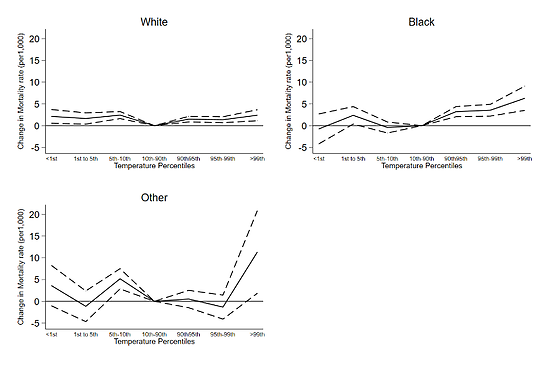Arbeitsbereich
Bevölkerungsdynamik und Nachhaltiges Wohlbefinden
Auf einen Blick
Projekte
Publikationen
Team
Projekt
The Impact of Climate Change and Environmental Exposures on Demographic Outcomes
Risto Conte Keivabu, Ugofilippo Basellini, Emilio Zagheni
Ausführliche Beschreibung
Climate change is posing several threats to societies and human well-being. Moreover, environmental exposures, such as heatwaves, floods, and wildfires, are expected to increase and thus to increasingly affect populations. These forms of environmental exposure influence a large number of demographic outcomes and have implications for individual well-being and macro-level population dynamics. For example, climate change is expected to redefine mortality trends, migration paths, and fertility behaviors. Critically, some sociodemographic groups and geographic areas might be at higher peril. It is thus paramount to map risks in order to inform policies geared toward adapting to climate change and to protecting the most vulnerable.
In recent years, research on the impact of environmental phenomena on demographic outcomes has largely increased. Several studies have shown how extreme temperatures affect migration, mortality, and fertility. But evidence on some countries (e.g., some low- and middle-income countries) on disparities by sociodemographic groups or on types of exposures is lacking. Crucially, the rapid and sustained emergence of data sources on demographic outcomes and environmental exposures, at a fine-grained geographic and temporal level, opens up new and exciting possibilities to improve our understanding of the relationships between population and environment. For example, Eurostat currently provides weekly death counts for several countries at the NUTS3 level; these can be matched with meteorological information at the same geographic and temporal unit provided by the Copernicus Data Store. Additionally, daily projected global temperature data at high spatial resolution, such as the Global Daily Downscaled Projections, enable us to produce projections of the impact that global warming might have on demographic outcomes in the future.
This project has two main aims. First, to leverage novel sources of climatic and demographic data to create a database that suits the needs of researchers interested in analyzing the impact of environmental exposures on population dynamics. Second, drawing on data from the newly created database, to provide new evidence on the impact of environmental phenomena on demographic outcomes such as mortality and fertility. To do so, we will leverage information on demographic outcomes on countries and on sociodemographic groups at high temporal and geographic granularity in order to understand which populations are more vulnerable to climate change and environmental exposures.
Our research has shown, among others, that extreme heat increases the probability of negative birth outcomes, particularly for newborns born to parents of low socioeconomic status in Spain. Additionally, we observed a socioeconomic gradient in temperature-related mortality in the country. In the United States, we quantified a racial gradient in temperature-related mortality and a projected increase in mortality disparities by race, both resulting from climate change.
Temperaturexposition und Sterblichkeit, nach ethnischen Gruppen, in den Vereinigten Staaten

Anstieg der monatlichen Sterblichkeitsrate (pro 1.000) bei Exposition gegenüber Temperaturbereichen, die die Anzahl der Tage zwischen der 1. und 99. county-spezifischen Temperaturperzentile in den Vereinigten Staaten zählen. Die Schätzungen nach Ethnie beruhen auf einer Interaktion zwischen den Temperaturbereichen und den Rassenkategorien. © Conte Keivabu, R., Basellini, U., Zagheni, E. (2022) Racial disparities in deaths related to extreme temperatures in the United States between 1993 and 2005. MPIDR Working Paper WP-2022-028.
Demografischer Wandel, Gesundheitsversorgung, Public Health, Medizin und Epidemiologie
Europa, Vereinigte Staaten, Welt
Publikationen
Conte Keivabu, R.:
Population and Environment 46:6, 1–20. (2024)

Zanasi, F.; Conte Keivabu, R.:
Vienna Yearbook of Population Research 22, 1–28. (2024)

Conte Keivabu, R.:
European Journal of Population 38:5, 1145–1182. (2022)

Conte Keivabu, R.; Basellini, U.; Zagheni, E.:
MPIDR Working Paper WP-2022-028. (2022)

Conte Keivabu, R.; Cozzani, M.:
Demography 59:5, 1631–1654. (2022)
